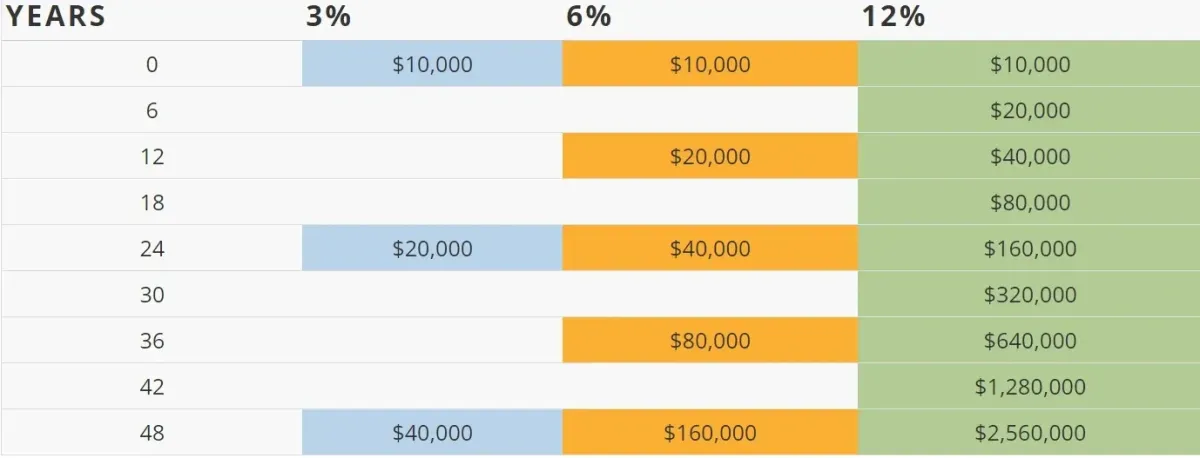The Rule of 72: A Simple Tool for Financial Growth
Unlock the Power of Compound Interest with the Rule of 72
Rule of 72
At Foster Financial Group, we believe in empowering our clients with the knowledge and tools they need to achieve financial success. One such tool is the Rule of 72—a straightforward method to estimate the time required for your investments to double. Whether you’re planning for retirement, saving for a major purchase, or looking to grow your wealth, understanding the Rule of 72 can help you make informed financial decisions.
Do you know the Rule of 72?
It's an easy way to calculate just how long it's going to take for your money to double. Just take the number 72 and divide it by the interest rate you hope to earn. That number gives you the approximate number of years it will take for your investment to double. As you can see, a one-time contribution of $10,000 doubles six more times at 12 percent than at 3 percent.

How many doubling periods do you have in your life?
This table serves as a demonstration of how the Rule of 72 concept works from a mathematical standpoint. It is not intended to represent an investment. The chart uses constant rates of return, unlike actual investments which will fluctuate in value. It does not include fees or taxes, which would lower performance. It is unlikely that an investment would grow 10% or greater on a consistent basis.
FAQS
What is the benefit of working with a financial advisor?
Working with a financial advisor offers numerous benefits. First and foremost, advisors provide expertise and guidance tailored to your unique financial situation and goals. They can help you create a comprehensive financial plan, optimize your investments, minimize taxes, and ensure you're on track to achieve your financial objectives. Additionally, advisors offer peace of mind, knowing that you have a professional managing your financial affairs and helping you make informed decisions.
How do I choose the right financial advisor for my needs?
Choosing the right financial advisor is a critical decision. Start by assessing your own financial goals and preferences. Look for advisors with the appropriate qualifications and certifications, such as Certified Financial Planner (CFP) or Chartered Financial Analyst (CFA). Consider their experience, specialization, and track record. It's also important to have a consultation or interview to ensure their approach aligns with your values and objectives. Lastly, check for transparency in fees and compensation to avoid surprises.
Do I need to have a lot of money to benefit from financial advisor services?
No, you don't need to be wealthy to benefit from financial advisor services. Financial advisors can assist individuals at various stages of their financial journey, from those just starting to save to those with substantial assets. Advisors can help you create a financial plan, manage debt, set up an emergency fund, and make the most of your resources, regardless of your current wealth. Their goal is to help you improve your financial well-being and work towards your financial goals, whatever they may be.

